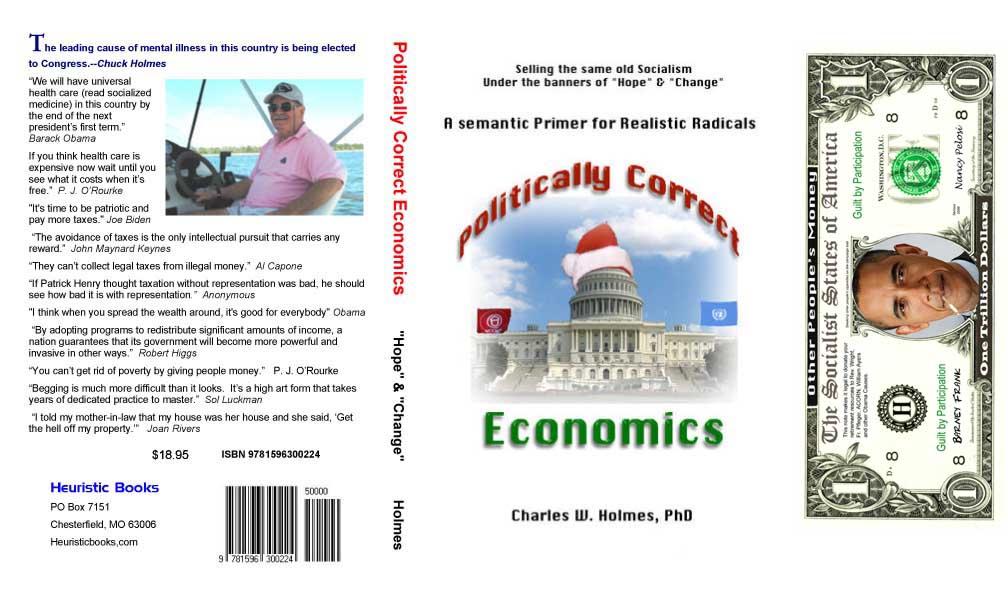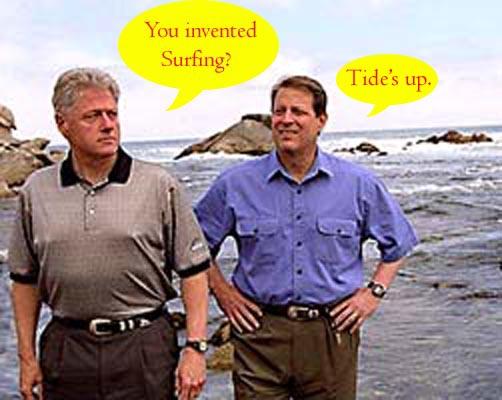Politically Correct Economics-
A semantic Primer for Realistic Radicals Selling the same old Socialism
under the banners of "Hope" & "Change"
by Charles W. Holmes, PhD

Obama Bucks Trillion Dollar bookmark (print & clip)

Other People’s Money
The difference between Charity and Theft. The difference
between noble
and nefarious
Have you noticed that people who are most generous with your
money are most stingy with their own?
Socialists hate private charity, because they want to spend
your
money on what they want, not on what you want.
Voluntary
programs are less subject to abuse because the donor can refuse to
give.
“Entitlements” are a license to demand and to steal. Socialism produces
a nation of leeches “entitled” to use the force of government to
help themselves to “free” food, housing, and medical care at your
expense.
Why work?
The solution is to get the government out of the "charity"
business.
Don't vote to "give" your money to the politicians, regardless of how
noble
the cause sounds. Don't approve the use of force to"redistribute
income"
following the whims of politicians. They have no "Divine Right" to do
this
to us.
Pay a lot less tax and give more to your favorite church or
other
voluntary organization. It will be a lot less expensive, and will
allow us all to keep control of our resources (otherwise known as
"Freedom").
Tithe, don't tax.
Get your copy of Politically Correct Economics at
amazon.com.
|
Other News:
The next big scheme to raise taxes and reverse prosperity is the
"global
warming" boondoggle:
"90% Certainty", Hot Air, Publication Bias and Perverse Optimism:
"Most problems are caused
by
solutions."
It was a little
disturbing
to read in last Sunday's St
Louis Post-Dispatch that "environmentalists" are proposing
to shoot pollutants up into the stratosphere to reduce the amount of
sunlight
in the hopes of correcting the "average temperature of the planet" to
some
arbitrary "optimal value" of almost 100 years ago--to reverse the
effects
of the industrial revolution.

Al Gore
has become a standard bearer for hyperbole on "global warming" that
appears
based on a belief that there is a "scientific concensus" with "90%
certainty"
that the earth is warming, that it is due to human meddling with the
environment,
primarily through evil industrialist generation of the "pollutant"
carbon
dioxide, and that this is a bad thing. Some of the "solutions" are
horrifying,
but mostly consist of blaming human prosperity, making it more
difficult
for humans to survive and providing more research funds for the people
who came up with this idea in the first place.
Publication Bias and the Peer Review Process:
The fact that many people who are promoting the Global
Warming
Story are making their fortunes in the global warming industry makes
one
wonder if there might be some publication bias effecting (deliberate
use
of this word) the "consensus." i.e. any study that
doesn't
support the notion of a serious problem related to anthropogenic
"greenhouse
gases" is "uninteresting" and unlikely to be published. This effect is
enhanced rather than corrected by the peer review process. Thus,
dissension
has been relegated to various weblogs and disagreements have been
occasions
for personal vilification rather than discussion of the data.
The recent iteration of the Intergovernmental Panel
on
Climate Change (IPCC) has been
trumpeted
to "remove all doubt" that accelerated global warming is due to
anthropogenic
greenhouse gas (AGHG) emissions, primarily carbon dioxide, and that if
severe measures are not taken to reverse the "pollution" of AGHG, then
the Earth will warm, flood, and storm and it will soon be too late to
fix
the problem. Newspaper reports (e.g. New
York Times) said all this is now established to be "90% certain."
The terminology, "90% certainty," is not something
I'd
encountered before in my 45-year scientific and statistical careers,
and
gives me some disquiet. Most scientists recognize that "90% confidence"
means there is a 10% probability that the particular results reported
occurred
by chance, and inferences about the nature of the universe may easily
be
in error. "90% confidence" is not very convincing to the statistician.
An inclination to overinterpretation is exacerbated because negative
results
are less likely to be published-- this is called the "publication
bias."
More publications supporting the importance of the work means more
grant
money and more prestige. Enthusiasm is good and leads to breakthroughs.
The overinterpretation is not caused by some scientists being
deliberately
deceptive, but scientists, too, must beware of enthusiasm overwhelming
objectivity.
Overinterpretation of Disasters and Perverse
Optimism:
The IPCC report on Climate Change 2007: The
Physical
Science Basis is a large document purporting to represent the
views
of 2,500 scientists, however the actual data is undergoing revision to
assure consistency with the Summary for Policymakers,
and
many of the 2,500 participants have contributed only to small parts of
the whole. Some of the participants have requested
their names be removed from the list of authors. I read the Summary
to try to find where this "90% certainty" came from, and actually found
that even this summary document, massaged by a small group, doesn't
support
anything near "certainty," or even what statisticians would describe as
"reasonable confidence". It seems the publication bias in the
scientific
literature is compounded by the publication bias in the news media and
entertainment arena (where Al Gore appears to fit in well).
Competition for audience leads to another layer of
exaggeration
to support the most spectacular interpretations. Thus, there is a
perverse
optimism that causes people to exult in tragic events, such as severe
hurricanes
and floods, because their credibility is enhanced by a perception of
ever
increasing crises. We have been treated to dramatic animations on the
(normal)
turnover of glacial ice, yet the IPCC Report notes "Antarctic sea ice
[90%
of the total ice in the polar ice caps] extent continues to show
inter-annual
variability and localized changes but no statistically significant
trends,
consistent with the lack of warming reflected in atmospheric
temperatures
averaged across the region." (p. 9) and that "Current global model
studies
project that the Antarctic ice sheet will remain too cold for
widespread
surface melting and is expected to gain in mass due to increased
snowfall."
(p.17)
This last winter, we were told that winter storms were
caused by global warming. Looks like all the bases are covered.
I have put an annotated
copy of the UN Summary report at the website, politicallycorrecteconomics.com
Maybe I'm reading this wrong, but it seems even the
highest
level of those who may be prejudiced by their personal stake in the
global
warming industry are unable to come up with a high level of confidence
in the anthropogenic GHG, global warming, extremes of weather or
massive
innundation of land areas story. It is remarkable that one could
conclude
with any level of confidence that sea level has risen by
almost 7 inches in the last 100 years. Not being an expert in the
field,
I can only marvel at what technological capability makes such a minute
measurement possible in the midst of all the variability and changes in
measurement techniques. Likewise, the estimate that the "global average
temperature" has risen by almost 1 degree C in that same time. It
is believed that these parameters were relatively constant over
many
millennia in the past, resulting in the "Hockey Stick" appraisal that
everything
has suddenly been subjected to a major disruption that is in some way
highly
correlated with atmospheric carbon dioxide. The "Hockey Stick"
dramatization
depends on the assertion that all has been quiet for several millennia
until the industrial revolution came along to disrupt the placidity of
Nature. Yet, even the authors of the UN Report must
admit
"proxy data (e.g., tree ring width) may be influenced by both local
temperature
and other factors such as precipitation, and are often representative
of
particular seasons rather than full years....Uncertainties generally
increase
into the past due to increasingly limited spatial coverage."
Some of the data behind these charts are on the web,
for example at http://data.giss.nasa.gov/gistemp/2004/
. Some of this is a little less disturbing if it's plotted
on a larger scale than hundredths of degrees, or for different time
periods. I guess that's why it's always shown as anomalies in
hundredths
of a degree. Some might—and did—warn of "an approaching ice age" from
the
apparent declining trend from 1940 through 1980. As a matter of fact,
it
was pretty much the same folks.
The idea that correlation necessarily implies
causality is
a dangerous notion.
I can show beyond a shadow of a doubt (confidence level
is
nearly one, as the probability of getting this result by chance is less
than 10-11) that highschool
students who don't visit a dentist are likely to have more sexual
activity.
This has led some of my statistics students to conclude that parents
had
best encourage their children to go to the dentist frequently in the
hopes
of slowing down premature adventurism. The relationship is undeniable,
but the causality is questionable. In this case, a possible
interpretation
is that the two phenomena are related because risky behavior in one
area
is likely to be associated with risky behavior in another area, not
because
bad breath improves social life.
One of the problems with the conclusion that the trace
amount of carbon dioxide in the atmosphere is the major forcing
component
of global temperature is the fact that statistical analysis shows the
correlation
between carbon dioxide concentration (from trapped ice bubbles) and
temperature
(from tree rings) has about a 900 year lag, wherein temperature rise
precedes
atmospheric carbon dioxide (and other gas) concentration increases.
Some
have taken this to suggest that the causality runs in the other
direction.
One mediating factor is that higher temperature reduces dissolved
carbon dioxide in the oceans. Another issue is that carbon dioxide is
essential
for plant growth and more carbon dioxide promotes better plant
growth--but
supposedly someone has considered that.

Some important aspects of the Report are in the
small
print. We learn for example, that "high confidence" means 80%
confidence,
and that " more likely than not" means about 50-50, hardly "beyond a
shadow
of a doubt" that should be the criterion when we are considering
drastic
corrective measures that are likely to increase famines and other
hardships
in much of the world. The document is replete with appropriate
admissions
that there are a lot of uncertainties to be resolved, not the least of
which is that carbon dioxide is a relatively minor component compared
to
water vapor, and "cloud feedbacks remain the largest source of
uncertainty."
So where did the "90% certainty" come from?
The only place with high confidence on the conclusions
(>99%,
"virtually certain") in summary table spm-2 is regarding projections
about
the future following from the Special Report on Emissions Scenarios
(SRES).
The SRES stated " Any scenario necessarily includes subjective elements
and is open to various interpretations." It seems curious that the
authors
should be so much more confident in their projections of the future
than
in their historical observations.
The truth of the matter is no doubt someplace between
the ardent skeptics--who disbelieve simply because of the person who
said
it--and the Global Warmmongers--who will continue to get good grants as
long as the public stays scared. For myself, I would welcome a
possibility
of milder Winters and an increase in vegetation that should follow from
plants having a richer source of carbon dioxide. Carbon dioxide is the
essential raw material for photosythesis of the nutrients on which all
life on Earth is dependent. Trees will grow better with more carbon
dioxide--even
if it doesn't get any warmer. Next, we'll be told Oxygen is a pollutant
if somebody can gain a political advantage from it. I frankly don't
trust
the politicians to do the right thing with our resources.

 |

We will have Christmas every day!
Guess what YOU are getting for Christmas!
|
|
In summary, one could question whether we should be
stampeded
into drastic measures to "correct" atmospheric carbon dioxide
concentrations
to some arbitrary level based on possible publication bias and perverse
optimism of a few people who may be overly enthusiastic in interpreting
data of questionable significance, statistical or otherwise.
Very large problems may be caused by solutions,
particularly,
by political solutions to problems of uncertain etiology or
significance.
Failure to provide adequate evidence doesn't mean
that
"Global Warming" theory is disproven--and catastrophic weather events
will
still happen even if there is no evident connection to "Global
Warming."
It would be nice if we could have more control over the
weather.
I certainly don't feel comfortable about shooting
pollution
into the atmosphere to reduce the warmth of the sun, and one could also
question the efficacy of buying trees for "carbon
offsets" from Al Gore's company, General Investment Management.
Possibly the popular
press assertion of "90% certainty" might be related to a footnote
on
page 2 that mentions the previous report (TAR) had used confidence
intervals
of 95% (2-sigma limits) around reported values, but confidence
intervals
were reduced to 90% for the current report--with the effect that
estimates
appear more precise.
R.J. Banis, PhD
St Louis Missouri
March 30, 2007
Statistics in the news:
Interesting links on controversial statistics issues in the
news:
Global warming
This is a fascinating and hotly argued issue that provides some
stimulating
examples of poor statistical reasoning.
The base issue appears to be relationship between atmospheric CO2
concentrations and climate change. Correlation is not causality, and a
look at the data allows strong questioning of the supposed "causal
relationship"
of CO2 to climate change.
CO2
science
The petition
project
and Environmental
Effects of Increased Atmospheric Carbon Dioxide
Response to
skeptics
by advocates of AGHG models--this site purports to refute the skeptics,
but much of the refutation appears to be name-calling and the
discussions
reinforce skepticism if you look at the data--see, for example, the
discussion
about correlation and causality for CO2 and temperature
change:
"There
is no proof that CO2 is causing global warming"
Climatescience.org
is a website by people who are making their living in the global
warming
industry. This is pretty much the official gospel by those who are paid
to preach it.
Annotated
UN IPCC paper on the "scientific basis" of the AGHG model
mostly
pointing out that the press reports on confidence levels were highly
exaggerated
and that the calamitous predictions are based almost solely not on
data,
but on computer models that have failed to predict even the past. See,
for example, the data on storm frequency and severity in the 2007 paper
on Environmental
Effects
of Increased Atmospheric Carbon Dioxide
The UN has a strong incentive to promote the AGHG fears as it's been
proposed that the solution is to grant
the UN power to tax industries and to regulate "carbon offset"
schemes. This tax would help to redistribute wealth by "supporting UN
development
projects in poor countries."
[UN Committee] "Members agreed that reversing the widening and
'shameful'
gap between rich and poor countries 'is the pre-eminent moral and
humanitarian
challenge of our age.'"
If you want to read more about this, just google united
nations carbon
tax.
Fascinating- and frightening.
So now we know what the "Global Warming" hubbub is all about.
|
related sites
pceconomics.com
politicallycorrecteconomics.com
politicallycorrectbook.com





